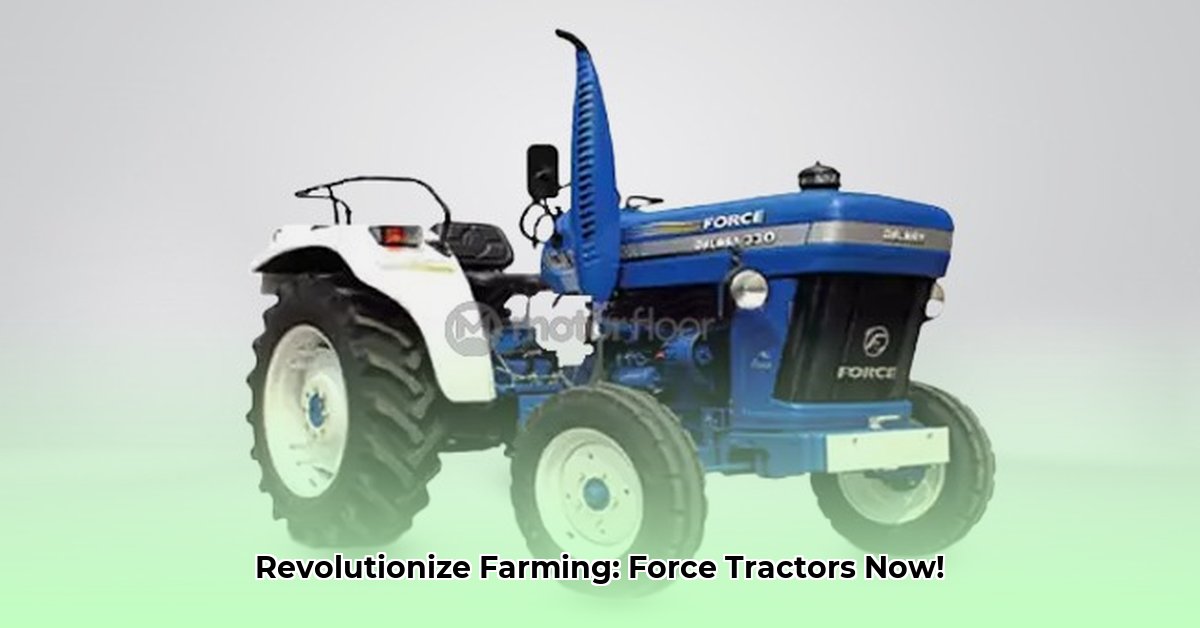
Force Motors, a prominent player in the Indian automotive sector since the 1950s, is steadily expanding its footprint in the agricultural machinery market. Leveraging vertical integration—controlling much of their production process from parts to finished tractors—Force Motors offers a range of models catering to diverse farming needs, from small-scale operations requiring nimble mini-tractors to large farms demanding powerful workhorses. Recent strong sales figures, particularly during October 2021, signal growing market acceptance. However, challenges remain in navigating a competitive landscape and capitalizing on the burgeoning demand for sustainable agricultural practices. For those considering purchasing a Force tractor, learn more about tractor financing options. This article examines Force Motors' position, its strategic initiatives, and its future prospects within the dynamic Indian agricultural sector.
Project DigiForce: A Technological Leap for Indian Farming
Recognizing the evolving needs of modern farmers, Force Motors has launched "Project DigiForce," a collaboration with EY-Parthenon. This initiative focuses on integrating digital tools to enhance farm efficiency, encompassing data-driven decision-making, optimized supply chains, and improved overall productivity. Project DigiForce signifies Force Motors' commitment to technological advancement and its proactive approach to meeting the challenges of modern agriculture. Isn't this a strategic move that could significantly impact their market share?
Market Analysis: Navigating the Competitive Landscape
While Force Motors boasts several strengths, including cost-effective manufacturing and a range of tractor models, its current market share in the Indian tractor market remains relatively small as of July 2025. This is primarily due to the intense competition from established industry giants. However, this smaller market share presents a significant opportunity for growth. By focusing on specific unmet needs within the farming community and tailoring its offerings accordingly, Force Motors can carve a larger niche for itself.
Sustainability: A Critical Element for Future Growth
The demand for sustainable agricultural practices is rapidly increasing in India. While Force Motors' technological advancements are noteworthy, its commitment to environmentally friendly farming is currently less defined. The absence of a robust sustainability strategy, incorporating emission reduction targets and the use of eco-friendly materials, poses a potential obstacle to long-term growth. Adopting clear sustainability initiatives is not merely a matter of corporate social responsibility; it's a key differentiator that can significantly impact market appeal and attract environmentally conscious farmers. How crucial is a comprehensive sustainability strategy to long-term success in the current market climate?
Fuel Efficiency and Pricing: A Delicate Balance
Force Motors’ focus on affordability makes its tractors attractive to farmers with limited budgets. However, rising fuel prices and the growing demand for fuel-efficient technology present a challenge. Maintaining a competitive price point while simultaneously modernizing its tractors to meet these evolving demands will require careful strategic planning and investment. Can Force Motors successfully navigate this balance between affordability and technological advancement?
The Future of Force Tractors: A Strategic Roadmap
The success of Force Motors hinges upon strategic decision-making and proactive adaptation to market dynamics. Its future trajectory depends on effectively leveraging its strengths and addressing its weaknesses.
Short-Term Goals (Next 1-2 Years):
- Optimize Project DigiForce: Implement robust Key Performance Indicators (KPIs) to monitor and refine the project's impact, ensuring tangible results.
- Targeted Marketing Campaigns: Craft marketing messages that effectively communicate the value proposition of Force Tractors—combining affordability and efficiency.
- In-depth Market Research: Conduct comprehensive surveys and focus groups to gain precise insights into the specific needs and preferences of farmers.
Long-Term Goals (3-5 Years and Beyond):
- Comprehensive Sustainability Strategy: Develop a detailed plan encompassing emission reduction targets, the utilization of sustainable materials, and transparent reporting.
- Expand Product Portfolio: Introduce new tractor models that prioritize fuel efficiency and incorporate environmentally friendly technologies.
- Strategic Partnerships: Forge collaborations with technology companies and research institutions to access cutting-edge technologies and expand market reach.
- Invest in R&D: Dedicate resources to R&D focused on reducing emissions, enhancing fuel economy, and incorporating farmer-centric features based on market research.
- Enhance After-Sales Service: Build a more expansive and responsive after-sales service network to foster customer loyalty and satisfaction.
Conclusion: Force Motors and the Future of Indian Farming
Force Motors' success is inextricably linked to the prosperity of Indian farmers. By focusing on cost-effective, technologically advanced, and environmentally responsible solutions, Force Motors can empower farmers to enhance their productivity, improve their harvests, and contribute to a more sustainable agricultural landscape. The future of Indian agriculture will be significantly shaped by companies like Force Motors, and their strategic choices will determine their success in this vital sector. The potential for growth is substantial, assuming they effectively address the opportunities and challenges outlined above.